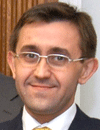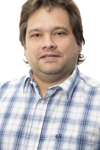Co-Located Conference AgendasFlow Chemistry Summit 2022 | Innovations in API Manufacture 2022 | 

Thursday, 17 March 2022 |
Please Refer to the APIs 2022 Agenda for Programming Details of Day 1 (Thursday, March 17, 2022) |
| |
Friday, 18 March 202208:00 | Morning Coffee and Pastries | 08:30 |  | Conference Chair Continuous Flow Synthesis of APIs
Paul Watts, Distinguished Professor and Research Chair, Nelson Mandela University, South Africa
When micro reactor technology was first introduced it was seen as a research and development tool suitable for small scale production, however it is now being used to produce large quantities of product. The key driver in these examples being safety, where the excellent mixing and heat transfer characteristics of micro structured reactors enables these highly exothermic reactions to be safely performed. There is now a plethora of commercial reactors on the market, which means that most companies are investigating this technology to rapidly screen reactions utilizing continuous flow, leading to the identification of reaction conditions that are suitable for use at a production level. The inherent safety associated with the use of small reactor volumes enables users to employ reaction conditions previously thought to be too hazardous for use within a production environment; such as extreme reaction conditions or the use of hazardous compounds. Consequently, the types of reactions available to the R&D chemist increases through the use of this technology. It is this system flexibility that has the potential to reduce both the time taken and risk associated with transferring reaction methodology from research to production. A selection of reactions demonstrated using this technology will be outlined. |
| 09:00 | Flow Chemistry and Reaction Engineering - Application to the Synthesis of Neuroprotective Agents
Darren Riley , Associate Professor, University of Pretoria , South Africa
The presentation will focus on the development of end-to-end flow-based synthetic routes to pharmaceuticals with a neurological focus and will include aspects of batch-flow hybridization and reaction engineering. Insight will also be given pertaining to the use of flow technology as a disruptive leap-frogging technology for the localization of pharmaceutical manufacturing in developing countries. | 09:30 | Synergistic Effect of Ultrasound Irradiation in Micro-structured Electrochemical Reactors
Simon Kuhn, Associate Professor, Katholieke Universiteit Leuven, Belgium
Organic electrochemistry enables a broad variety of reactions, and electrochemical transformations in general have the potential to replace traditional catalytically activated reactions for e.g. heterocycle synthesis. At the same time, new developments in small-scale flow reactors have increasingly gained attention as convenient tools for more efficient syntheses compared to traditional batch procedures. Small-scale flow reactors provide uniform residence times, well-defined flow patterns, and precise temperature control. Their advantage for electrochemical reactions in particular is their large surface to volume ratio and the reduced ohmic resistance. This minimizes supporting electrolyte requirements so that less purification steps are required and enables green chemistry. However, one of the challenges that needs to be overcome to establish continuous micro-scale electrochemical reactors is that due to their prevailing laminar flow profile, species transport, which occurs normal to the flow direction between the electrodes, is rather slow. This drastically limits the achievable throughput of electrochemical microreactors. In this contribution, we will present the design of an electrochemical reactor with integrated ultrasound actuators. The acoustic irradiation will lead to a synergistic effect which increases species transport between the electrodes via acoustic streaming. To guide the efficient design and integration of the piezoelectric actuators, we developed an analytical model which calculates the transmission of the piezoelectric actuator vibration to the liquid flowing in the reactor. Depending on the frequency at which the actuators are driven, a standing sound wave is excited in the channel. In this resonance mode, the acoustic pressure will strongly couple with the fluid, leading to a secondary flow structure with vortical motions, strongly enhancing species transport (acoustic streaming). As a proof-of-principle, this reactor is applied to achieve controlled electrolyte-free atom transfer radical polymerization of methyl acrylate. | 10:00 | Intensification of Biocatalysis using Flow Chemistry
Thomas Wirth, Professor, Cardiff University, United Kingdom
The advantages of increased mixing of biphasic reaction mixtures in flow offers great potential compared to conventional flask techniques, especially when combined with microwave irradiation, sonication or phase transfer catalysis. In his presentation, Thomas Wirth will illustrate that enzyme- and metal-catalyzed reactions can be performed advantageously in biphasic systems. | 10:30 | Mid-Morning Coffee Break | 11:00 | Application of Flow Chemistry to Active Pharmaceutical Ingredient Process Development
Jenny-Lee Panayides, Principal Scientist and Research Group Leader, CSIR Biosciences South Africa, South Africa
The presentation will focus on our group efforts to adapt flow technology for the manufacture of active pharmaceutical ingredients in developing countries. Our case studies will highlight the development of a flow-based route to a non-steroidal anti-inflammatory drug and discuss progress towards the development of an economical platform for controlling and automating flow equipment.
| 11:30 |  | Keynote Presentation Flow Chemistry in Drug Discovery: An Automated Tool to Introduce C(sp3) into Drug Molecules
Jesus Alcazar, Principal Chemist, Janssen Research & Development, Spain
Drug discovery process is currently under pressure to get bioactive molecules in the most efficient way. One approach that has been highlighted is the increasing fraction of the C(sp3) atoms in the final target compounds. However, methodologies to introduce C(sp3) fraction into drug molecules are still challenging for medicinal chemistry and most high throughput chemistry in pharma relies on amide coupling, Suzuki reactions, reductive amination, nucleophilic substitution and sulfonylations. There is a clear need to develop new methodologies for such transformations that can be applicable in a Drug Discovery setting. Continuous flow chemistry has recently emerged as a novel chemical tool that can help synthetic chemists to access forbidden or forgotten chemistries and make them real alternatives for other more classical methods. In this way it enables access to novel chemical space not available by traditional batch procedures. In this presentation we are going to disclose how flow chemistry can be applied to discover new procedures for C(sp3) bond formation to increased Fsp3 in a Drug discovery. These new methodologies can be transferred to automated platforms for the preparation of libraries and access this new chemical space in a high throughput format. |
| 12:15 | Networking Lunch | 13:30 | Exploiting Controlled Reaction-diffusion Conditions For Materials Synthesis
Josep Puigmarti-Luis, ICREA Professor, Universitat de Barcelona, Spain
In this oral contribution, I will present how controlled reaction-diffusion (RD) process occurring in continuous flow microfluidic devices can be used as an advanced tool to control chemical processes and materials synthesis. | 14:00 |  Stacking the Stirred Tanks for Efficient Mixing and Solids Handling Stacking the Stirred Tanks for Efficient Mixing and Solids Handling
Nikolay Cherkasov, Managing Director, Stoli Chem
Case studies into using multi-CSTR reactors for handling exothermic, multiphase, and reactions with solids. Impellers, in contrast to passive mixers, decouples residence time from mixing and enables rapid mass transfer and quick scalability.
| 14:30 | Flow Chemistry as Enabling Technology for Introducing Sustainability in Chemical Synthesis
Renzo Luisi, Professor of Organic Chemistry, University of Bari, Italy
Flow chemistry is becoming widely recognized as an enabling technology for the development of less impactful synthetic processes. From laboratory to industrial scale production, flow technology is changing the way synthetic chemists perform reactions and plan their synthesis. In this context, the use of flow technology and microreactors for the development of new synthetic strategies using highly polar organometallic reagents represents an endless research area. The continuous flow preparation of valuable and unprecedented heterocycles, fluorinated scaffolds as well as new sulfur isosteres will be the topic of this communication. | 15:00 | Mid-Afternoon Coffee Break | 15:30 | Accelerating the Production of Psychotropic Drugs with Flow Technology
Jean-Christophe Monbaliu, Professor of Organic Chemistry, Center for Integrated Technology and Organic Synthesis (CiTOS), University of Liège, Belgium
I will present the most recent work from CiTOS on the development of scalable and versatile flow processes for the manufacturing of psychotropic drugs. More specifically, I will discuss the journeys towards the flow production of ritalin, ketamine, amphetamines, modafinil and fentanyl analogs. The main challenges and opportunities, as well as a reflection on potential dual use will be stressed. | 16:00 | Flow Chemistry: A Sustainable Voyage through the Chemical Universe en route to Smart Manufacturing
Milad Abolhasani, Associate Professor , North Carolina State University, United States of America
Due to pressing negative environmental impacts, raw material shortages, and vulnerabilities in chemical supply chains, it has become increasingly important to improve the adaptability as well as the energy, time, and material efficiency of each step of the chemical process life cycle. The COVID-19 pandemic has highlighted many of these issues, as the world became acutely aware of supply-chain dependencies which are vulnerable to regional catastrophes. Modular distributed manufacturing approaches have the potential to withstand these disruptions through risk diversification. In addition, reconfigurable chemical manufacturing systems are amenable to pivoting chemical production to address changing market demands. This seminar will focus on how flow chemistry technologies can enable the realization of these new paradigms and meet the demands of the next generation of modular, accessible, and sustainable chemical and materials research, development, and manufacturing. First, I will discuss how convergence of process intensification and chemical synthesis with artificial intelligence can accelerate navigation through chemical universe of advanced functional materials and molecules toward smart manufacturing. Next, I will present a self-driving laboratory for on-demand synthesis and scalable manufacturing of energy-relevant materials. Finally, I will present the unique reconfigurability aspect of flow chemistry to close the scale gap in chemical and materials research through facile switching from the reaction exploration/exploitation to production mode. | 16:30 | Next Gen Syn
Kerry Gilmore, Assistant Professor, University of Connecticut, United States of America
With an ever-increasing mastery over the methods of bond formation and functional group transformation, what is the next stage of development for organic chemists? In this talk, we will discuss how the role of a chemist is shifting away from the instrument that performs the reactions to what we chemists are trained for – analysis, constructing understanding, and extrapolating from both an experimental and conceptual level. The two key tools being integrated that will drive this shift are automation and machine learning. We will discuss how automated instrumentation can and should be developed, aimed at complementarity and connectedness as opposed to “one ring to rule them all”. We will also look to the use of machine learning to predict complex, sensitive processes – but from a broader, not reaction specific, perspective. Finally, we’ll touch on how these tools can be made accessible and integrated to achieve rapid development in a site-independent manner. | 17:00 | Poster Presentation Virtually by Nicole Neyt, University of Pretoria. Poster Title: Design and Testing of an Ozonolysis Reactor Module with on-the-fly Ozone Degassing Under Flow Conditions | 17:30 | Close of Programming on Day 2 of the Conference |
|


 Add to Calendar ▼2022-03-17 00:00:002022-03-18 00:00:00Europe/LondonFlow Chemistry Summit 2022Flow Chemistry Summit 2022 in Boston, USABoston, USASELECTBIOenquiries@selectbiosciences.com
Add to Calendar ▼2022-03-17 00:00:002022-03-18 00:00:00Europe/LondonFlow Chemistry Summit 2022Flow Chemistry Summit 2022 in Boston, USABoston, USASELECTBIOenquiries@selectbiosciences.com